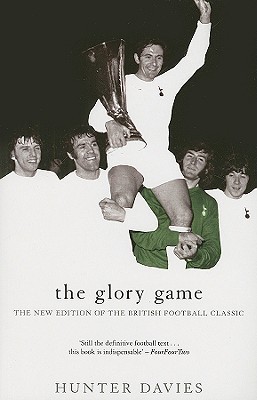The Glory Game by Hunter Davies
Sportswriter’s in America are – rightfully – respected. Conversely, their English counterparts aren’t granted equal adulation. However, the emergence of works by people like David Conn and Jonathan Wilson has earned this particular genre deserved – and overdue – applause.
 But one book, published way back in 1972, will forever remain the bible of football books.
But one book, published way back in 1972, will forever remain the bible of football books.
This book is The Glory Game. And its author is Hunter Davies.
Stanley Kubrick, talking about Arthur Schnitzler’s German novellaDream Story, said: “… a difficult book to describe – what good book isn’t it?” And the mysterious filmmaker’s maxim applies perfectly to The Glory Game. For example, Davies’ exhaustive endeavour is – paradoxically – of its time (I mean, he paints a brilliantly vivid picture of that particular era – the fashion and football etc), yet timeless (as ultimately a player’s fears, hopes, ambitions et al are eternal).
And compared to the standard-issue footballer’s biography, The Glory Game looks like Tolstoy. American satirist Ambrose Bierce once wrote a review saying only, “The covers of this book are too far apart,” and this sentence springs to mind when one thinks of today’s seasonal scrapbooks and glorified gossip pamphlets.
But Davies’ words bite into the paper and bleed upon the page. For instance, “I really am scared. I don’t know why. I don’t like the dark and going to bed on my own… I go to pieces on my own. I must have company,” Martin Chivers charmingly confesses when his wife’s away. And I cannae imagine Jack Wilshire or Wayne Rooney admirably acknowledging a weakness like this. I mean, what would it do to their ‘brand’ or sensitive personas?
[linequote]Bill Nicholson is unquestionably the story’s hero and most complex character. He’s what Tony Soprano termed ‘the strong, silent type.'[/linequote]
The Glory game was penned only 10 years after the £20 a week maximum wage was abolished, and the past is a foreign country: they do things differently there. Eddie Bailey’s (Nicholson’s no. 2) endless war metaphors – like, “Right bayonets on, over the top. Let’s have you!” – permeate the prose. And when Ralph Coates signs from Burnley, Davies details how the winger’s new home has “no phone, no radio and no television’’ and ‘‘the beds no blankets” – imagine that, modern football’s millionaire! Plus steak was still on the pre-match menu.
Bill Nicholson is unquestionably the story’s hero and most complex character. He’s what Tony Soprano termed “the strong, silent type.” And Bill’s wife Darky concurs, “He’s very Yorkshire. He never shows what he’s thinking. When he comes in from a match I can’t tell from looking at him whether they’ve won or lost…”
Nicholson’s also portrayed as obsessive (“Bill spent at least an hour going through the menu, standing in the middle of the room and reading it out, getting them to choose by a show of hands what they wanted,” Davies discloses) and anachronistic (“basically, he doesn’t think women have any place in football. I never saw him play for Spurs and I’m not allowed to go and see them now,” says her indoors). And sometimes pre-match – when he involuntarily violently shakes and profusely sweats from the stress – Bill cuts a forlorn, almost kind of tragic figure.
Davies’ simple syntax and subtle moments of levity (like when the author along with the Telegraph’s David Millar, Colin Malam of the Sun and Steve Curry of the Express are wrongly pictured on the front of a French daily beneath a caption which reads: The stars of the celebrated Tottenham team arriving at Nantes airport yesterday”) affords the book its ageless accessibility. Although there is also a whiff of English entitlement and condescension which has seemingly been a prerequisite of sports reporting in this country since time immemorial: ‘‘In the next match, Mr Chivers scored a hat-trick. Admittedly it was against Keflavik of Iceland which wasn’t really fair.”
[authquoteright text=”Davies’ exhaustive endeavour is – paradoxically – of its time [/linequote]
Football becoming big business has meant a burgeoning book market. Even Roy Keane’s dog Triggs has had her satirical – and surprisingly readable – life story sold. And somebody like the wonderful Jonathan Wilson may write something equivalent to Shakespeare, but never again will a journalist be granted such great freedom – I mean, not with every player having contracts complete with complex image right deals etc – to peer behind a football club’s curtain and tell their tale warts and all.
This fact, for me, contributes to The Glory Game being the greatest football book… and maybe Hunter Davies’ masterpiece.
[author name=”Ramòn Benítez” tag=”RamònBenítez[/linequote]
All views and opinions expressed in this article are the views and opinions of the writer and do not necessarily represent the views of The Fighting Cock. We offer a platform for fans to commit their views to text and voice their thoughts. Football is a passionate game and as long as the views stay within the parameters of what is acceptable, we encourage people to write, get involved and share their thoughts on the mighty Tottenham Hotspur.
Would you like to write for The Fighting Cock?